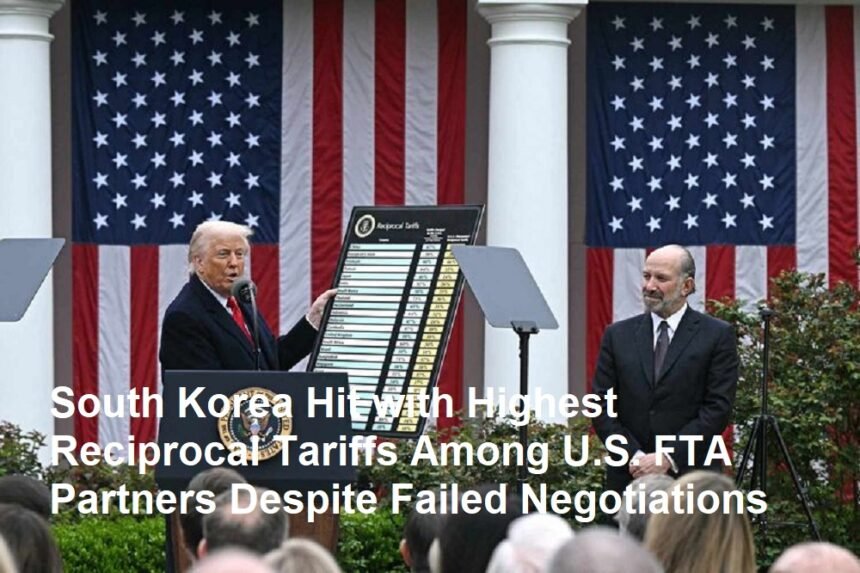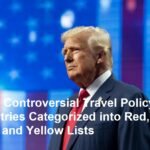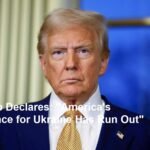South Korea has been slapped with the steepest reciprocal tariffs among 20 nations holding free trade agreements (FTAs) with the United States, following unsuccessful efforts by Seoul to secure lower rates compared to key allies like Japan and the European Union. The decision, reported by The Korea Times on Monday, has sparked concerns over escalating trade friction between the long-standing partners and raised questions about the future of the U.S.-Korea FTA, which has governed bilateral trade since 2012.
Tariffs Imposed: A Blow to Seoul’s Trade Strategy
Under the newly announced U.S. trade measures, South Korean exports—particularly in sectors like steel, automotive components, and electronics—face tariffs averaging 25%, the highest rate applied to any FTA partner. By contrast, Japan and the EU negotiated lower tariffs, ranging from 10% to 15%, after months of behind-the-scenes lobbying. The discrepancy underscores Washington’s hardening stance toward Seoul, despite the two nations’ shared economic and security interests.
The tariffs, framed by the U.S. as “reciprocal adjustments” to address trade imbalances, target industries where American officials claim Korean exporters benefit from state subsidies or lax regulatory standards. Notably, the U.S. Trade Representative (USTR) singled out South Korea’s steel and chemical sectors, accusing them of “market-distorting practices” that undermine U.S. manufacturers.
Failed Negotiations: A Diplomatic Setback
Seoul had aggressively lobbied Washington for months, seeking parity with Japan and the EU, but its appeals were reportedly dismissed during high-stakes talks last week. The Korea Times cited unnamed government sources who blamed the breakdown on “diverging priorities” and the U.S.’s insistence on linking tariff concessions to broader demands, including increased South Korean purchases of American agricultural goods and stricter intellectual property enforcement.
“We presented data showing Korean industries comply fully with international trade norms, but the U.S. fixated on perceived inequities,” a South Korean trade official told the newspaper. “This outcome risks eroding trust in the FTA framework.”
The failure marks a stark reversal from 2018, when Seoul renegotiated the KORUS FTA under pressure from the Trump administration, agreeing to quotas on steel exports and concessions for U.S. automakers.
Economic Fallout: Industries on Edge
The tariffs deal an immediate blow to major South Korean exporters. Steel giants like POSCO saw shares tumble 6% on Monday, while automakers Hyundai and Kia warned of potential price hikes for U.S. consumers. Analysts estimate the tariffs could cost South Korea up to $3.5 billion in annual exports, with small- and medium-sized enterprises (SMEs) in manufacturing bearing the brunt.
“This isn’t just about large corporations—it’s about thousands of suppliers whose survival depends on U.S. demand,” said Park Ji-young, an economist at the Korea Institute for Industrial Economics. “The timing is terrible, given sluggish global demand and rising production costs.”
Japan and EU: A Study in Contrast
The disparity in tariff treatment has fueled frustration in Seoul. Japan, despite ongoing trade disputes with the U.S. over semiconductors, secured exemptions for critical tech exports, while the EU leveraged its collective bargaining power to shield automotive and luxury goods. Experts argue South Korea’s smaller market size and geopolitical reliance on U.S. security alliances weakened its negotiating position.
“South Korea lacks the EU’s clout or Japan’s strategic tech role in U.S. supply chains,” said Robert Kim, a trade analyst at Seoul National University. “Washington knows Seoul has fewer alternatives, which tilts negotiations in America’s favor.”
Political Repercussions and Public Backlash
The tariff decision has ignited criticism within South Korea, with opposition lawmakers accusing President Yoon Suk Yeol’s administration of mishandling trade diplomacy. “This is a humiliation,” said Lee Jae-myung, leader of the Democratic Party. “The government prioritized ideological alignment over pragmatic deal-making, and our economy pays the price.”
Meanwhile, U.S. officials defended the move as “necessary to level the playing field.” A USTR spokesperson stated, “While we value our partnership with South Korea, we cannot ignore practices that harm American workers.”
Long-Term Implications: Rethinking Trade Alliances
The dispute has prompted calls for South Korea to diversify its trade partnerships and reduce dependence on the U.S. market. Discussions about accelerating free trade talks with ASEAN nations and India have gained traction, though such shifts would take years to yield results.
For now, businesses face a fraught landscape. “We’re reassessing our U.S. investments,” said a senior executive at LG Chem, speaking anonymously. “The tariffs make long-term planning impossible.”
As South Korea grapples with the steepest tariffs among U.S. FTA partners, the fallout underscores the fragility of even the most entrenched trade alliances. With domestic industries reeling and diplomatic tensions simmering, Seoul faces mounting pressure to recalibrate its economic strategy—or risk further erosion of its competitive edge. For Washington, the move risks alienating a key Asian ally at a time when geopolitical unity is paramount. As the U.S. and South Korea navigate this new reality, the rules of trade and diplomacy appear more uncertain than ever.












